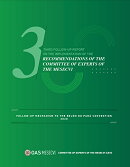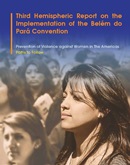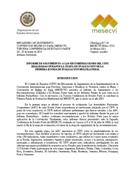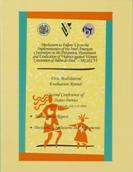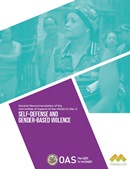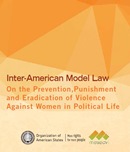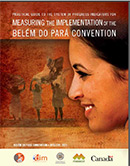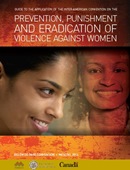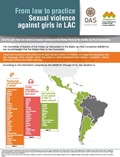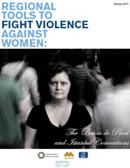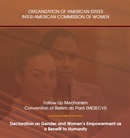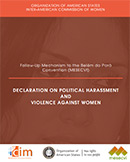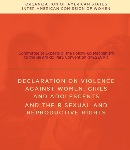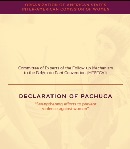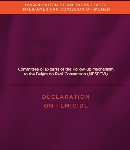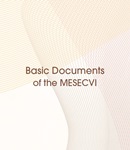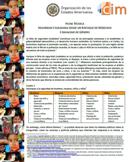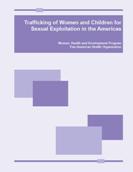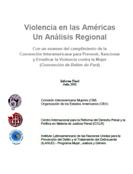- English
- Español
Library
Hemispheric Reports | Thematic Reports | General Recommendations | Tools | Political Declarations | Other documents | Review
Periodic, rigorous, and participatory analysis is an essential component of the effective, sustainable implementation of the Belém do Pará Convention.
Presented below are the reports, evaluations, and other key documents on implementation of the Convention and on the incidence, causes, costs, and consequences of violence against women in the region.
Hemispheric Reports on the Implementation of the Belém do Pará Convention
|
Third Follow-up Report on the Implementation of the
Recommendations of the Committee of Experts of the MESECVI This report seeks to share progress and challenges in the prevention of violence against women based on the eradication of stereotypes in legislation, national plans, access to justice, information and statistics, and the budget from an intersectional approach to the diversity of women and girls. Each chapter includes a series of conclusions made by the CEVI, on the prevention and harmonization efforts carried out by the States for a better implementation of the Convention of Belém do Pará. |
|
Third Hemispheric Report on the Implementation of the Belém do Pará Convention This report presents the progress of 24 countries in the region in the effective compliance with the obligations assumed upon ratification of the Convention of Belém do Pará. With the inputs provided by the States, as well as by 26 civil society organizations that submitted 24 national and 2 regional shadow reports, the Committee of Experts and the Technical Secretariat conducted an in-depth study of each response in light of the standards established in the Convention in relation to the following thematic axes: Legislation, National Plans, Access to Justice, National Budgets and Information and Statistics, offering recommendations to the States to strengthen their implementation from a perspective of the obligations of prevention contained in the Convention. |
|
Second Follow-up Report on the Recommendations of the Committee of Experts of the MESECVI The Second Follow-up Report reviews the implementation of the 42 recommendations made by the Committee of Experts in 2012, as well as the progress made by the States Parties to the Belém do Pará Convention in their implementation of the Convention. |
|
Second Hemispheric Report on the Implementation of the Belém do Pará Convention (MESECVI, 2012) The Second Hemispheric Report reviews the progress made by the States Party in their implementation of the Belém do Pará Convention, as well as the significant challenges that remain in the region in terms of a timely, appropriate and effective response to acts of violence against women, from a perspective of human rights. The Report consolidates the results and recommendations from the 28 national reports presented to the MESECVI during the Second Multilaterial Evaluation Round, and offers a comparative overview of the progress made between the First and Second Rounds. | |
|
First Follow-up Report to the Recommendations of the Committee of Experts (MESECVI, 2010) The First Follow-up Report synthesizes the responses from 18 States Party to a series of 38 indicators, developed by the Committee of Experts, on the implementation of their recommendations. The indicators, both qualitative and quantitative, cover the five issues examined during the First Multilateral Evaluation Round: legislation, national plans, access to justice, national budgets, and information and statistics. Baje la publicación completa en: Español, Inglés, Portugués o Francés |
First Hemispheric Report on the Implementation of the Belém do Pará Convention (MESECVI, 2008) The First Hemispheric Report reviews the progress made by the States Party in their implementation of the Belém do Pará Convention, as well as the significant challenges that remain in the region in terms of a timely, appropriate and effective response to acts of violence against women, from a perspective of human rights. The Report consolidates the results and recommendations from the 28 national reports presented to the MESECVI during the First Multilaterial Evaluation Round. Download the full publication in: English, Spanish, Portuguese or French |
Thematic Reports on Critical Areas of Concern
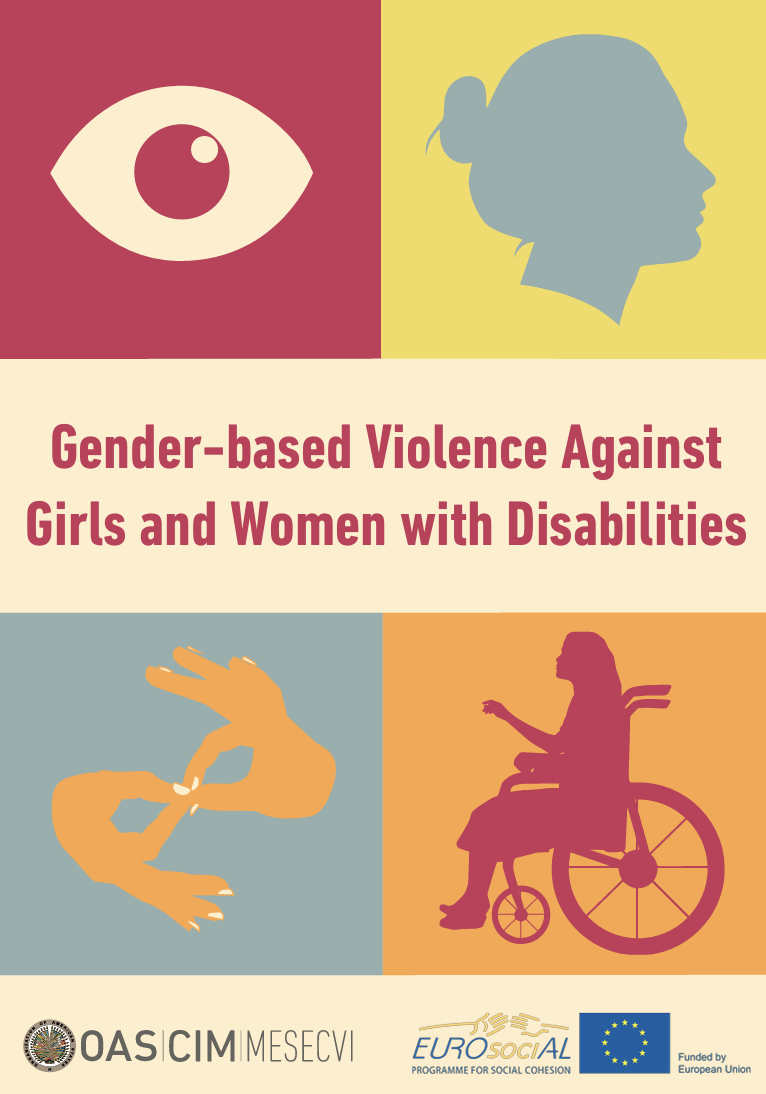 |
Gender-based violence against girls and women with disabilities
(MESECVI,
2022) This thematic
report seeks to raise awareness of the violence that affects girls and women
who live with a disability based on both their gender and disability and
ameliorate access to justice for victims or survivors of this type of
violence.
|
|
Hemispheric Report on Sexual Violence and Child Pregnancy in the States Party to the Belém do Pará Convention (MESECVI, 2017) The aim of this report is to provide providing information on the links between sexual violence and child pregnancy and the multiple violations of human rights that these entail, as well as to provide comprehensive recommendations to States Party oriented to improving the effectiveness of the measures taken to guarantee the right of girls to live a life free of violence. The Report addresses the main consequences of sexual violence - child pregnancy, maternal mortality and forced marriages. It highlights the severe situation of maternal mortality among girls aged 10 to 14. |
General Recommendations of the Committee of Experts
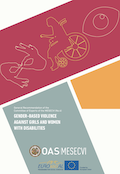 |
General
Recommendation of the Committee of Experts of the MESECVI (No.4):
Gender-based violence against girls and women with disabilities
(MESECVI, 2022) Through this
General Recommendation, the Committee of Experts addresses the various acts
of violence against women that are committed due to their disability and
their gender, identifying patterns and measures to address them.
Drawing
attention to the disability factor enables progress in promoting the right
of women to be free from violence by including this matter as an aggravating
factor.
Download the full publication in English or Spanish
|
|
General Recommendation of the Committe of Experts of the MESECVI (No.1): Self-Defence and Gender-Based Violence (MESECVI, 2018) The Committee of Experts of the MESECVI has called attention to the case of many women who have ended the lives or caused an injury to their aggressors as victims of illegitimate aggressions in the sphere of their interpersonal relationships, including the domestic sphere and those defensive acts against aggressions of gender-based violence. In this General Recommendation, the Committee analyzes the international obligations of States Party to the Convention to ensure women's access to the argument of self-defense in those cases in which, as a response to the situation of violence experienced, they have engaged in such conduct. |
|
General Recommendation of the Committe of Experts of the MESECVI (No.2): Missing Women and Girls in the Hemisphere (MESECVI, 2018) The Committee of Experts recognizes that in some countries of the region there are high numbers of women and girls reported as missing. Because this is a form of violence against women, as well as its connection with other forms of violence such as femicide, trafficking in women and girls and sexual violence, protected by the Convention, this General Recommendation seeks to frame the disappearance of women and girls within the Convention, and therefore, delineate the obligations of the States Parties to prevent, investigate, punish and eradicate this form of violence against women and girls. |
Tools
|
Standards for the Protection of the Human Rights of Women: Necessary Tools for the Defence of Women's Political Participation (CIM, MESECVI and UN Women, 2020) Developed by CIM, MESECVI and UN Women, this practical legal guide brings together a systematic and analytical compilation of 130 judgments, decisions, and resolutions in paradigmatic cases, so that both civil society and public institutions -legislative, executive, and judicial- may have access to tools for the cross-cutting application of the protection standards in force in international human rights law, related to cases of gender-based violence against women. Violence against women in politics is included. |
|
Inter-American Model Law on the Prevention, Punishment and Eradication of the Gender-Based Killing of Women (Femicide/Feminicide) (MESECVI, 2018) Pursuant to the Declaration on Femicide of 2008, this Model Law seeks to provide an integrating view of the problem and to be a tool for States and stakeholders in the defense of women's rights, to enjoy the highest standard of protection and interpretation when guaranteeing and demanding the rights established in the Belém do Pará Convention. |
|
Inter-American Model Law on the Prevention, Punishment and Eradication of Violence against Women in Political Life (MESECVI, 2017) Within the context of its work, the MESECVI has recognized the progress of States in the prevention and punishment of violence against women in the private sphere, however, it has also repeatedly emphasized that "these actions do not cover all manifestations of violence against women, especially those produced in the public sphere," and has affirmed the need to make progress in legislation that puishes violence against women perpetrated in the public sphere. This Model Law is a contribution to closing this gap, in response to the growing concern of the Mechanism over violence against women perpetrated in political spaces. |
|
Practical Guide to the System of Progress Indicators for Measuring the Implementation of the Belém do Pará Convention (MESECVI, 2014) With a view to achieving more in-depth evaluation of the implementation of substantive monitoring of the exercise of women's rights to live free from violence, this Guide aims to strengthen knowledge on the use of indicators developed to measure the impact of the implementation of the Belem do Para Convention in the countries of the region. The objectives are to facilitate more accurate measurement of the extent to which States Party implement the Convention and make it possible to quantify and appraise the process over time. Download the full text of the publication in: English or Spanish |
|
Guide to the application of the Inter-American Convention on the Prevention, Punishment and Eradication of Violence against Women (Belém do Pará Convention) (MESECVI, 2014) With a view to supporting States in their duty to protect women's human rights and eliminate situations of violence that may affect them, this Guide aims to strengthen knowledge, interpretation and application of the Belém do Pará Convention. The general objectives of the Guide are facilitate understanding by the States of their responsibilities from a complementary vision of the Convention and other human rights instruments, and to promote the fulfillment of these responsibilities in the the prevention, care and punishment of violence against women. |
|
Infographics - Implementation of the Belém do Pará Convention This series of infographics seeks to call attention to specific aspects of the implementation of the Belém do Pará Convention and highlight progress and persistent challenges in the States Party. Download the infographics on:
|
|
Regional tools to fight violence against women:The Belém do Pará and Istanbul Conventions (MESECVI, 2014) In the framework of a side-event organized by the MESECVI and the Council of Europe as part of the 58th session of the UN Commission on the Status of Women (CSW) in March 2014, this publication seeks to support the strategies and actions of both organizations to advance the agenda for women’s equality. Within this framework, and among the agreed bi-regional targets, the right of women to live a life free of violence has been defined as a priority. Download the full text of the publication in: English or Spanish |
Political Declarations
|
Declaration on Gender Equality and Women's Empowerment for the Good of Humanity In this Declaration, the MESECVI Committee of Experts expresses its concern over the proliferation and impact of discourses and campaigns organized by conservative sectors that justify discrimination, harmful practices, the sexual division of labor, or the exclusion of women from public and political power, and reaffirms that equality between men and women and life free from violence are human rights and that "gender" a methodological instrument used to examine and reveal unequal relations of power between men and women in order to defend the human rights of women Download the full text of the Declaration in English or Spanish |
|
Declaration on Political Harassment and Violence Against Women In this Declaration, the MESECVI call attention to the multiple manifestations of harassment and violence against women in the political sphere and urge to prevent, address and punish these crimes. Download the full text of the declaration in English or Spanish |
|
Declaration on Violence against Women, Girls and Adolescents and their Sexual and Reproductive Rights In this Declaration, the Committee of Experts of the MESECVI calls attention to the links between violence against women and girls and their sexual and reproductive rights. Download the full text of the declaration in English or Spanish |
|
Declaration of Pachuca: “Strengthening efforts to prevent violence against women” (MESECVI, 2014) In this Declaration, the Executive Committee of the CIM 2013-2015 and the Committee of Experts of the MESECVI call attention to the crucial role that education and communication play in the prevention of violence, and urge greater action from States on this issue. Download the full text of the declaration in English or Spanish |
|
Declaration on Femicide (MESECVI, 2008) In this Declaration, the Committee of Experts of the MESECVI calls attention to the magnitude of the phenomenon of femicide (gender-based killing of women), defines the concept and calls on States to tipify it. Download the full text of the declaration in English or Spanish |
Other documents
|
The EDVAW Platform's contributions to the implementation of the Beijing Platform for Action (MESECVI, EDVAW Platform, 2020) In the context of its 25-year review, the EDVAW Platform launched two e-booklets during a high level panel on 17 March 2021, in the margins of the 65th session of the Commission on the Status of Women: 1) Beijing Platform for Action: Contributions of the Platform of independent expert mechanisms on the elimination of discrimination and violence against women (EDVAW Platform) towards its implementation (2020); and 2) EDVAW Platform and the Commission on the Status of Women: call for a human rights based approach in the implementation of strategies for the elimination of discrimination and violence against women. Download the full text of the publication in English |
|
Basic Documents of the MESECVI This series of documents includes:
|
|
Technical Briefs (MESECVI, 2011) This series of technical briefs presents a brief summary of the achievements, challenges and opportunities in the implementation of the Belém do Pará Convention, both in general terms and in specific areas. |
|
In Modern Bondage: Sex Trafficking in the Americas (CIM, 2002) The trafficking of women for sexual exploitation is a daily reality for the regions of Central America and the Caribbean. It affects each country uniquely, with a different combination of challenges for government agencies, non-governmental organizations and society in general. This study presents the results of research in Belize, Costa Rica, El Salvador, Guatemala, Honduras, Nicaragua, Panama and the Dominican Republic Download the full text of the study Other documents:
| |
|
Violence in the Americas: A Regional Analysis (CIM, 2001) By the fifth anniversary of the entry into force of the Convention of Belém do Pará (2000), it was apparent that the profound changes anticipated as a result of the Convention had not taken place. Civil society, international organizations, and the CIM examined what had been achieved in order to determine the real impact of the strategies for eradicating violence against women. This report provides an analysis of progress made in implementing the Convention up to 2000, the obstacles faced, and future endeavours. Download the full text of the Regional Report Sub-regional analyses:
|



